 Petzlover
Petzlover Both Cockachon and Doxiepoo are originated from United States. Cockachon may grow 14 cm / 6 inches higher than Doxiepoo. Both Cockachon and Doxiepoo are having almost same weight. Both Cockachon and Doxiepoo has same life span. Both Cockachon and Doxiepoo has same litter size. Cockachon requires Low Maintenance. But Doxiepoo requires Moderate Maintenance
Both Cockachon and Doxiepoo are originated from United States. Cockachon may grow 14 cm / 6 inches higher than Doxiepoo. Both Cockachon and Doxiepoo are having almost same weight. Both Cockachon and Doxiepoo has same life span. Both Cockachon and Doxiepoo has same litter size. Cockachon requires Low Maintenance. But Doxiepoo requires Moderate Maintenance
 The Cockachon is not a pure bred dog but rather a cross between the Cocker Spaniel and the Bichon Frise. Very little if anything is known about who initially developed the Cockachon. It is known that the International Designer Canine Association (IDCA)registered and recognized the hybrid in 2009.
The Cockachon is not a pure bred dog but rather a cross between the Cocker Spaniel and the Bichon Frise. Very little if anything is known about who initially developed the Cockachon. It is known that the International Designer Canine Association (IDCA)registered and recognized the hybrid in 2009.
It is obviously a relatively new cross breed. The hybrid is also recognized by the American Canine Hybrid Club (ACHC), International Designer Canine Registry (IDCR) and the Designer Dog Kennel Club (DDKC).
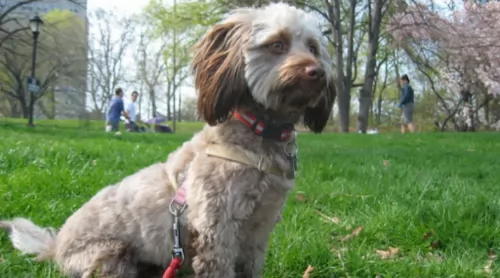 The Doxiepoo is a designer dog breed - a combination of the Dachshund who was used to hunt for Badgers and the Poodle, a dog bred in France to essentially be a lap dog. There is however some dispute as to whether the Poodle descends from Germany or from the French Barbet.
The Doxiepoo is a designer dog breed - a combination of the Dachshund who was used to hunt for Badgers and the Poodle, a dog bred in France to essentially be a lap dog. There is however some dispute as to whether the Poodle descends from Germany or from the French Barbet.
Wherever the parents hail from, the Doxiepoo hails from the United States of America.
With both the Poodle and the Dachshund being intelligent, fun and loving type of canines, the two of them together have brought out a wonderful hybrid pet in the Doxiepoo. Today, the Doxiepoo is bred with other Doxiepoos.
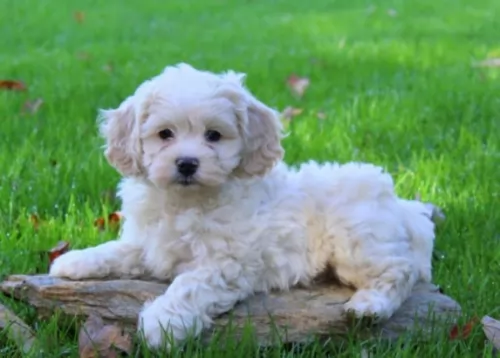 The Cockachon is a cute, little dog very popular in current times. He is small, compact, dark eyes, a round head and black nose. He has a baby face and fluffy hair. It has a furry tail and a blunt muzzle.
The Cockachon is a cute, little dog very popular in current times. He is small, compact, dark eyes, a round head and black nose. He has a baby face and fluffy hair. It has a furry tail and a blunt muzzle.
The Cockachon is a mix between the American Cocker Spaniel and the Bichon Frise. In order to get a better idea of what the hybrid can look like just look at the individual parents. The American Cocker Spaniel is a small dog with a short muzzle and domed head. It is in the Sporting Group, but it is the smallest member of the group. He has a compact, sturdy body and though domed his head is refined.
The Cocker’s stance includes a sloping topline, muscular hindquarters and strong shorter legs adds up to a balanced canine. The coat can be in a wide variety of colors including liver, golden, black, and red. Also, it could be liver and tan, black and tan, roan or tricolors. So, while the Bichon Frise is always white the Cockachon can be any of these colors including white. The types of coats that the Cocker Spaniel and the Bichon Frise have are very different as well.
The Bichon Frise is also a small dog, actually smaller than the American Cocker. The Cockachon usually ends up being about the size of the Bichon at 5-10 kg in weight and 23-30 cm in height. The skull of the Bichon Frise is round rather than domed and the muzzle is also rounded. The tail is long and curly while the Cocker would usually have a cropped tail. The nose and eyes of the Bichon Frise are black and its hair is dense and curly. Unlike the Cocker Spaniel it barely sheds.
Many Cockachon have floppy ears, curly coats and come in any variety of colors though many, many are white.
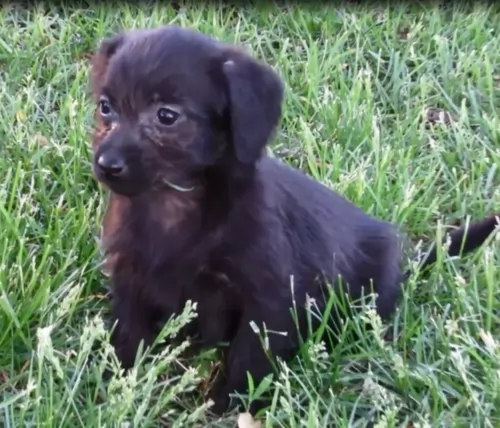 The Doxiepoo can range from being a small to medium sized dog, standing at anything between 20cm to 25cm in size and weighing between 3kg and 7kg, depending much on whether a standard, miniature or toy sized poodle was used in the breeding.
The Doxiepoo can range from being a small to medium sized dog, standing at anything between 20cm to 25cm in size and weighing between 3kg and 7kg, depending much on whether a standard, miniature or toy sized poodle was used in the breeding.
The Doxiepoo could look like either one of the two breeds, but he will have a strong, sturdy body with a curly or wavy coat of varying lengths and various colors - cream, black, tan, apricot, grey or white. The poodle side of him ensures he is a hypoallergenic dog.
Between the Dachshund and the Poodle, you’re going to get a wonderful array of characteristics as they both come with their strong points. Certainly you will be well entertained and amused by your pet, while he can also be useful as a watchdog.
Being a small dog, he will fit well into life in the city or in the countryside. He is as bright as a button and learns tricks and new skills quickly. With training and socialization he becomes obedient and well behaved wherever he is, getting on well with other pets in the home as well as with all children and adults.
The Doxiepoo is a lively, alert, energetic dog and will require being exercised – lots of ball games and a walk will keep him lean, muscular and content.
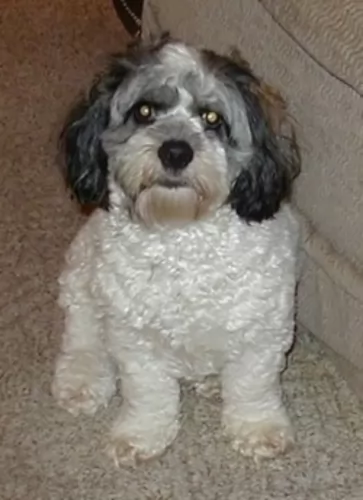 People created the Cockachon to get a small, lap or carry dog that had certain characteristics. These characteristics included a very social, loving dog. He is active and friendly, sweet and gentle. He is loyal, and loves being loved. He is great with other dogs and you can trust him with your children. He is a little independent but very loyal.
People created the Cockachon to get a small, lap or carry dog that had certain characteristics. These characteristics included a very social, loving dog. He is active and friendly, sweet and gentle. He is loyal, and loves being loved. He is great with other dogs and you can trust him with your children. He is a little independent but very loyal.
Like many little dogs he can have serious separation anxiety. Crate training is recommended so that he has a place to feel safe when you are not with him.
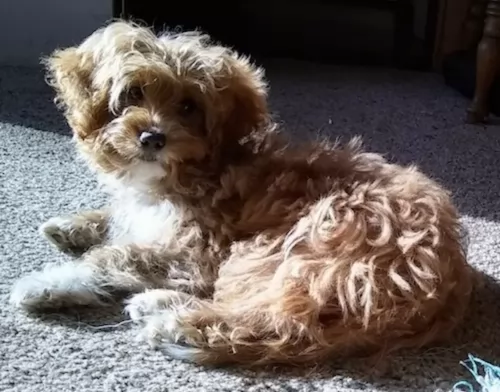 Every dog, even the little ones like this, will require some kind of input from you if you want to get the best from him. Every puppy bought as a gift when they’re cute and cuddly turns into an adult, and often the very person who received him as a gift, loses interest and neglects him. Then they wonder why the dog becomes irritating and destructive.
Every dog, even the little ones like this, will require some kind of input from you if you want to get the best from him. Every puppy bought as a gift when they’re cute and cuddly turns into an adult, and often the very person who received him as a gift, loses interest and neglects him. Then they wonder why the dog becomes irritating and destructive.
A dog is a long term investment and if you commit to your sweet Doxiepoo, you’ll get years and years of devoted friendship.
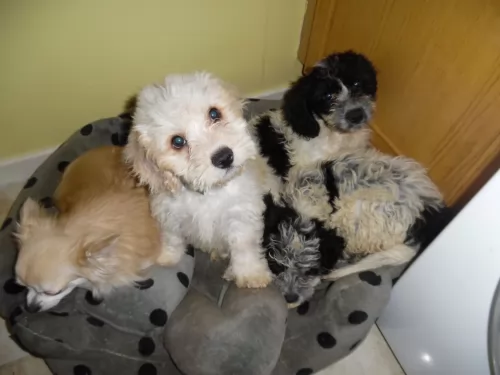 Hybrid dogs seldom have a lot of inherited diseases as they seem to jump a generation but if they do, it can be either a combination of both breeds issues or issues from just one of the breeds in the cross. For the Cockachon these issues include:
Hybrid dogs seldom have a lot of inherited diseases as they seem to jump a generation but if they do, it can be either a combination of both breeds issues or issues from just one of the breeds in the cross. For the Cockachon these issues include:
This loose kneecap issue is common to many small dogs and can cause lameness if not addressed.
Eyelid problems such as the ones that might bother a Cockachon can be found in many small dogs. These include Entropion and Ectropion.
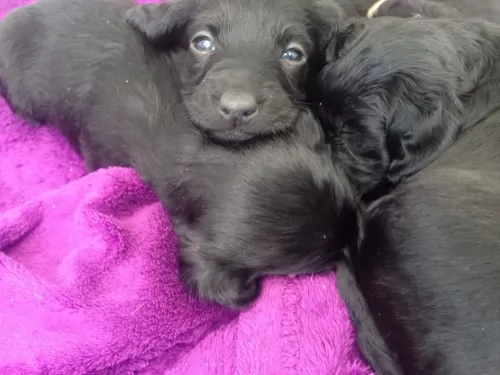 The life expectancy of the Doxiepoo is around 12-15 years of age if he is well looked after. He is a robust dog, but he can still face some health issues that both his parents contend with.
The life expectancy of the Doxiepoo is around 12-15 years of age if he is well looked after. He is a robust dog, but he can still face some health issues that both his parents contend with.
Just some of the diseases that the Doxiepoo might face while in your care are ear- and skin infections, dental disease, digestive tract problems, heart conditions and epilepsy. If you think your pet has any kind of illness, it is imperative to get him to the vet for a checkup.
Poodles, particularly are prone to skin disorders. They can be allergic to grass, parasites and food. If your Doxiepoo chews or licks his paws or some other area a lot, and the skin is red, he could have a skin allergy.
The vet will be able to diagnose your dog’s allergies with some skin- or blood testing. For instance, sebaceous adenitis is an inherited allergy that affects the lubrication of the skin and hair follicles. Symptoms of the disease include scaly skin, sore and even hair loss.
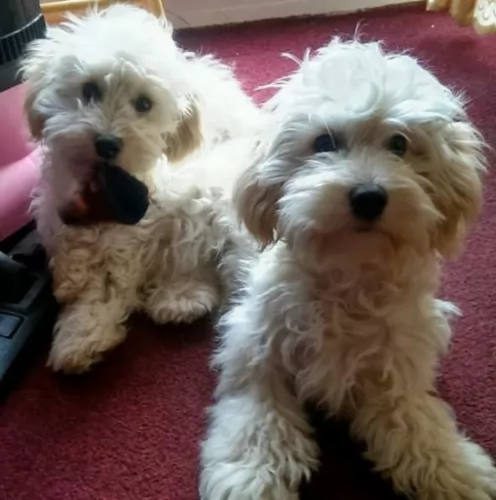 Don’t overfeed a Cockachon. Give him ¾ -1.5 cups of dry food of high quality in two meals per day.
Don’t overfeed a Cockachon. Give him ¾ -1.5 cups of dry food of high quality in two meals per day.
In addition to the issues listed above, the Cockachon is also prone to heart disease and cardiac issues.
The Cockachon has a lot of energy for its size. Make sure it gets plenty of exercise. If walks are the exercise of your choice make sure you walk him for 30 minutes a day. He loves to play, and a back yard would be nice. These little guys do well in obedience but are usually to small for agility.
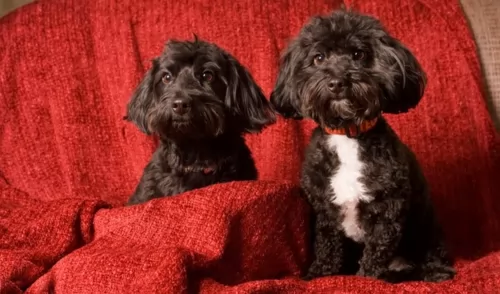 You can’t be sure what kind of coat your Doxiepoo will have but he will certainly require brushing at least twice a week. In some instances it may be wise to seek out the services of a professional groomer who does an excellent job of trimming the hair, cleaning the teeth, checking the ears and clipping the nails.
You can’t be sure what kind of coat your Doxiepoo will have but he will certainly require brushing at least twice a week. In some instances it may be wise to seek out the services of a professional groomer who does an excellent job of trimming the hair, cleaning the teeth, checking the ears and clipping the nails.
The Doxiepoo, just like any other dog, will need to be trained and socialized early as he is a stubborn dog and will need to be trained to be obedient. With this training and socialization, he becomes amicable around children and pets in the home. He learns easily too and this is what makes him a great pet for first time dog owners.
The Doxiepoo is a moderate energy dog, so he will do well on a walk every day. You can also make use of ropes, balls and frisbees to give him a bit of a workout in the garden.
He loves water too and will enjoy a run on the beach and cooling off in the ocean. He adapts easily to life in the city or in the country, so long as he is with his human companions.
The Doxiepoo will eat dry kibble, particularly if it is from the highest quality brands and chosen according to the dog’s size, age and activity levels.
Now and then you can add in a little bit of cooked rice, vegetables and chicken for variety. Some raw meat can play an important role in keeping the skin healthy and free from dryness and itchiness. Make sure that he always has fresh, cool water available to him.